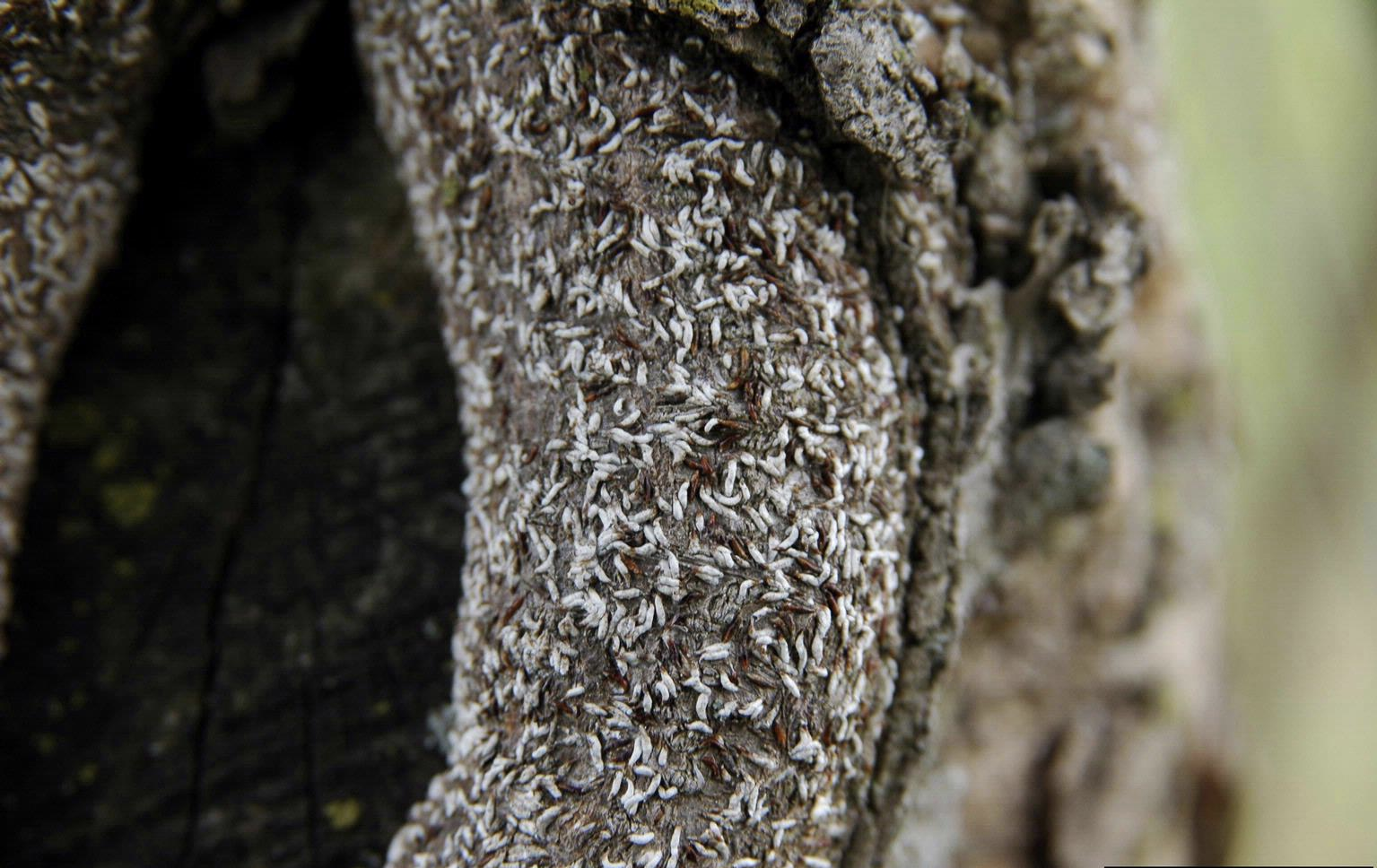
See all posts by this author
Japanese maple scale is an exotic armored scale species that infests a wide range of host plants (45 genera in 27 families) in the eastern United States. It infests some of the most common nursery and landscape plants in North Carolina including:
- red maple (Acer rubrum)
- Japanese maple (Acer palmatum)
- dogwood
- broadleaf evergreens like holly, Japanese holly, and boxwood
These armored scale insects have a hard cover, called a test that protects them from their external environment. Adult scales are oyster shell shaped and 1 – 1.8 mm in length. Male and female adults look similar in shape but the females have a thicker, dark brown cover, which is the remnant of the second instar exoskeleton. The adult tests are often covered with white wax which can be wiped off to expose the brown cover. Beneath the test, scale bodies and eggs are usually purple.
Japanese maple scales typically infest the trunk and branches of trees but have been observed on leaves in heavy infestations. They use piercing-sucking mouthparts to penetrate the tree tissue and feed on parenchyma cells just beneath the bark. This damages the tree by robbing it of nutrients and energy necessary to grow. Heavily infested trees will exhibit twig and branch dieback, thinning canopy, and a gradual decline in health. The bark of heavily infested trees will have a bumpy white texture due to scale insect covers. Once scales die, the cover will often remain attached.
Of course, prevention and treatment for Japanese maple scale is included in a Plant Health Care subscription from Arborscapes. (As are myriad other pests and diseases) If you would like to become a part of our Plant Health Care program, reach out to Arborscapes today! Your living landscape will be the envy of the entire neighborhood!
Cultural Control
Research has shown that other armored scale insect species are more abundant and damaging in urban than rural or natural areas. In addition, the amount of surrounding vegetation and impervious surface affect the temperature and water availability to the trees. Therefore, consider the characteristics of the landscape when planting or managing a tree. Reducing plant stress by proper planting and watering may reduce susceptibility to infestation by Japanese maple scale. However, excessive fertilizer may increase scale abundance by making the tree more nutritious to scales and reducing the trees natural defenses.
Mechanical Control
Prune out infested branches. Light to medium infestations may be reduced with pressure wash applications. High-pressure water sprays can wash scales and scale covers off bark and reduce populations without the need for chemical controls. Make applications when trees are dormant for the winter and make sure the water pressure is not removing or damaging tree bark.
Biological Control
Parasitoid wasps and other natural enemies such as lacewings, lady beetles, and predacious flies may provide sufficient control to maintain a low population of Japanese maple scale. At least four species of parasitoid wasps are known to attack this scale along the eastern United States. However, in habitats that are not hospitable to natural enemies or where broad-spectrum pesticides are used, natural enemy control may not be sufficient.
Chemical Control
Insecticide applications should coincide with crawler emergence for best control. This is challenging for Japanese maple scale because crawlers emerge over an extended period. Therefore, broad-spectrum contact insecticides such as pyrethroids may not be effective and can contribute to the problem by killing natural enemies. Avoid foliar applications of broad-spectrum insecticides.
Horticultural oils and dormant oils kill insects by smothering them and breaking down cell membranes. Dormant oil applications should be made in the fall after leaf drop or spring prior to bud break. These may be more practical when treating trees that are smaller in size. There is additional information on horticultural oils in Horticultural Oils as Insecticides.
Trunk sprays or soil drenches of systemic insecticides such as dinotefuran, clothianidin, and acephate may provide effective, season-long control of many armored scale insects. Acetamiprid is a systemic insecticide that can be applied to foliage. Insect growth regulators such as pyriproxyfen and buprofezin can also provide effective control and are applied to foliage as soon as crawlers begin to emerge.
Combining preventive measures with targeted interventions will offer the best protection against dogwood scale. Always read and follow label instructions when applying insecticides, and consider potential impacts on beneficial insects and the surrounding environment. You can learn more about Japanese maple scale by clicking here.
And if all of this sounds like too much work, contact Arborscapes to subscribe to our Plant Health Care program, and we will take care of this, other pests, fertilization and health concerns for your living landscape!
Photo courtesy of Brian Kunkel, University of Delaware, Bugwood.org
See all posts by this author
